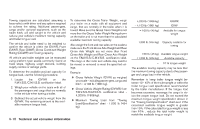2009 Nissan Altima Owner's Manual - Page 355
2009 Nissan Altima Manual
Page 355 highlights
Always verify that available capacities are within the required ratings. WARNING Trailer hitch components have specific weight ratings. Your vehicle may be capable of towing a trailer heavier than the weight rating of the hitch components. Never exceed the weight rating of the hitch components. Doing so can cause serious personal injury or property damage. Ball mount The hitch ball is attached to the ball mount and the ball mount is inserted into the hitch receiver. Choose a proper class ball mount based on the trailer weight. Additionally, the ball mount should be chosen to keep the trailer tongue level with the ground. TOWING LOAD/SPECIFICATION TOWING LOAD / SPECIFICATION UNIT: lb (kg) MAXIMUM TOWING LOAD MAXIMUM TONGUE LOAD 1,000 (454) 100 (45) Sway control device Sudden maneuvers, wind gusts, and buffeting caused by other vehicles can affect trailer handling. Sway control devices may be used to help control these affects. If you choose to use one, contact a reputable trailer hitch supplier to make sure the sway control device will work with the vehicle, hitch, trailer and the trailer's brake system. Follow the instructions provided by the manufacturer for installing and using the sway control device. Hitch ball Choose a hitch ball of the proper size and weight rating for your trailer: ● The required hitch ball size is stamped on most trailer couplers. Most hitch balls also have the size printed on the top of the ball. ● Choose the proper class hitch ball based on the trailer weight. ● The diameter of the threaded shank of the hitch ball must be matched to the ball mount hole diameter. The hitch ball shank should be no more than 1/16" smaller than the hole in the ball mount. ● The threaded shank of the hitch ball must be long enough to be properly secured to the ball mount. There should be at least 2 threads showing beyond the lock washer and nut. TOWING SAFETY Trailer hitch Choose a proper hitch for your vehicle and trailer. Make sure the trailer hitch is securely attached to the vehicle, to help avoid personal injury or property damage due to sway caused by crosswinds, rough road surfaces or passing trucks. Class I hitch Class I trailer hitch equipment (receiver, ball mount and hitch ball) can be used to tow trailers of a maximum weight of 2,000 lb (909 kg). Technical and consumer information 9-19
















